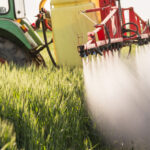3 ways BIG AG is poisoning our food supply
 (NaturalHealth365) Big agriculture is in the spotlight now that the public is learning about how the industry’s cost-cutting ways have resulted in unhealthy food with minimal nutrients, empty calories, and addictive ingredients. It wasn’t long ago when the fruits and vegetables available in local stores were chock-full of vitamins and minerals. Nowadays, the majority of the produce we consume is grown with harmful pesticides. Big Agriculture tech has improved, yet cancer and diseases are still prevalent, creating a progress paradox in desperate need of our collective attention.
(NaturalHealth365) Big agriculture is in the spotlight now that the public is learning about how the industry’s cost-cutting ways have resulted in unhealthy food with minimal nutrients, empty calories, and addictive ingredients. It wasn’t long ago when the fruits and vegetables available in local stores were chock-full of vitamins and minerals. Nowadays, the majority of the produce we consume is grown with harmful pesticides. Big Agriculture tech has improved, yet cancer and diseases are still prevalent, creating a progress paradox in desperate need of our collective attention.
Today’s toxic food stems from how plants are grown, focusing on phosphate fertilizer. However, consumers are busy to the point that they cannot keep track of Big Agriculture’s practices. So here are the dirty details on the state of the world’s food industry.
Phosphate fertilizer contains radioactive element, raising question about food safety
Though few are aware of it, phosphate fertilizer used by Big Agriculture is slightly radioactive due to its unique component referred to as polonium-210. The problem with using even a small amount of this radioactive element is that it has the potential to be absorbed by the plants we depend on for sustenance and continued health. Rewind to 2015, glyphosate used within the aforementioned fertilizer was formally labeled as a human carcinogen.
Glyphosate is tied to many health issues, including damage to the internal organs over time and even cancer. Though the scientific and medical communities are not completely certain phosphate directly causes cancer, it is clear that it is a toxic component that Big Agriculture must address in due time.
Industrial waste, heavy metals in biosolids linked to cancer, organ damage
The word “biosolids” (sewage sludge) certainly sounds intimidating, yet their toxic components are not as complex as they appear on their surface. The fertilizer used to grow crops contains PFAS chemicals. Such chemicals are much more likely to cause health problems, including issues with the thyroid, liver, and other internal organs. Crops serve as the conduit between the toxic components and the consumer, ultimately compromising the human body as time progresses.
If BIG AG is going to re-establish a rapport with the public, it will have to address the use of toxic sludge for crop growth in the near future. Unfortunately, industry heads haven’t shown a willingness to alter their ways, meaning toxic sludge will be used to grow the food we need for sustenance until consumers and/or food industry regulators take action.
Weed killer causes DNA and pineal gland damage and more
Though it might be hard to believe, the glyphosate used by farmers and others in the agricultural industry to inhibit weed growth has the potential to cause DNA damage and possibly even damage to the acorn-shaped pineal gland in the center of the brain that might one day be revealed as the spiritual center of the human body. Damage to the pineal gland is tied to neurological problems and gut dysbiosis, diseases ranging from Parkinson’s to anxiety, depression, and even autism. Pineal gland damage might also catalyze the release of a hormone that stimulates the thyroid, potentially setting the stage for hypothyroidism to develop across the aging process.
The answer to this quandary is simple: consumers should consider boycotting Big Agriculture in favor of smaller, local farmers who grow organic crops without weed killers and other chemical-laden products. Alternatively, federal regulators could ramp up regulations on Big Agriculture, forcing the industry to clean up its practices and grow healthy and nutritious food that advances the greater good as opposed to corporate profits.
Sources for this article include:



